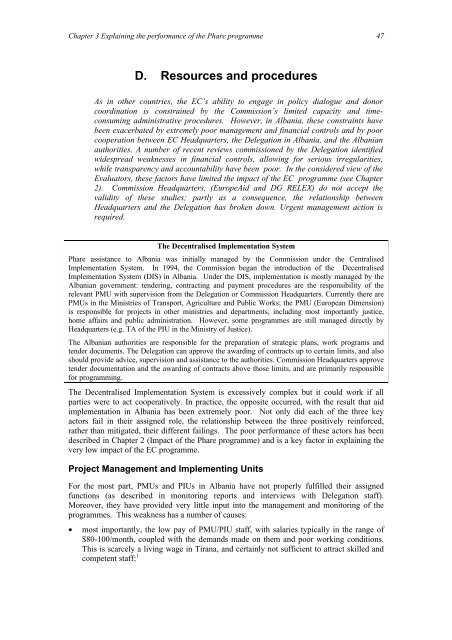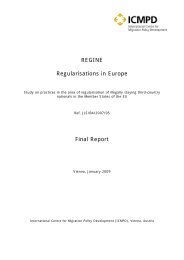Final Report - European Commission - Europa
Final Report - European Commission - Europa
Final Report - European Commission - Europa
Create successful ePaper yourself
Turn your PDF publications into a flip-book with our unique Google optimized e-Paper software.
Chapter 3 Explaining the performance of the Phare programme 47<br />
D. Resources and procedures<br />
As in other countries, the EC’s ability to engage in policy dialogue and donor<br />
coordination is constrained by the <strong>Commission</strong>’s limited capacity and timeconsuming<br />
administrative procedures. However, in Albania, these constraints have<br />
been exacerbated by extremely poor management and financial controls and by poor<br />
cooperation between EC Headquarters, the Delegation in Albania, and the Albanian<br />
authorities. A number of recent reviews commissioned by the Delegation identified<br />
widespread weaknesses in financial controls, allowing for serious irregularities,<br />
while transparency and accountability have been poor. In the considered view of the<br />
Evaluators, these factors have limited the impact of the EC programme (see Chapter<br />
2). <strong>Commission</strong> Headquarters, (EuropeAid and DG RELEX) do not accept the<br />
validity of these studies; partly as a consequence, the relationship between<br />
Headquarters and the Delegation has broken down. Urgent management action is<br />
required.<br />
The Decentralised Implementation System<br />
Phare assistance to Albania was initially managed by the <strong>Commission</strong> under the Centralised<br />
Implementation System. In 1994, the <strong>Commission</strong> began the introduction of the Decentralised<br />
Implementation System (DIS) in Albania. Under the DIS, implementation is mostly managed by the<br />
Albanian government: tendering, contracting and payment procedures are the responsibility of the<br />
relevant PMU with supervision from the Delegation or <strong>Commission</strong> Headquarters. Currently there are<br />
PMUs in the Ministries of Transport, Agriculture and Public Works; the PMU (<strong>European</strong> Dimension)<br />
is responsible for projects in other ministries and departments, including most importantly justice,<br />
home affairs and public administration. However, some programmes are still managed directly by<br />
Headquarters (e.g. TA of the PIU in the Ministry of Justice).<br />
The Albanian authorities are responsible for the preparation of strategic plans, work programs and<br />
tender documents. The Delegation can approve the awarding of contracts up to certain limits, and also<br />
should provide advice, supervision and assistance to the authorities. <strong>Commission</strong> Headquarters approve<br />
tender documentation and the awarding of contracts above those limits, and are primarily responsible<br />
for programming.<br />
The Decentralised Implementation System is excessively complex but it could work if all<br />
parties were to act cooperatively. In practice, the opposite occurred, with the result that aid<br />
implementation in Albania has been extremely poor. Not only did each of the three key<br />
actors fail in their assigned role, the relationship between the three positively reinforced,<br />
rather than mitigated, their different failings. The poor performance of these actors has been<br />
described in Chapter 2 (Impact of the Phare programme) and is a key factor in explaining the<br />
very low impact of the EC programme.<br />
Project Management and Implementing Units<br />
For the most part, PMUs and PIUs in Albania have not properly fulfilled their assigned<br />
functions (as described in monitoring reports and interviews with Delegation staff).<br />
Moreover, they have provided very little input into the management and monitoring of the<br />
programmes. This weakness has a number of causes:<br />
• most importantly, the low pay of PMU/PIU staff, with salaries typically in the range of<br />
$80-100/month, coupled with the demands made on them and poor working conditions.<br />
This is scarcely a living wage in Tirana, and certainly not sufficient to attract skilled and<br />
competent staff; 1
















